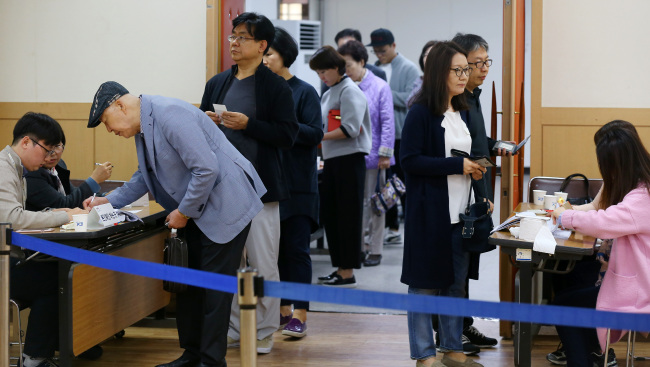More than 24 million of 42.1 million eligible voters headed out to pick the country’s 20th National Assembly at some 14,000 voting stations across the nation Wednesday.
Worried that bad weather in the morning may influence voter turnout, public officials drove cars attached with speakers around communities to air announcements from the National Election Commissions to encourage voting.
“To remind them to vote, which takes less than a minute, we are airing announcements to people on the streets,” said an official from Yongsan’s Community Service Center.
Thanks to shortened and digitalized voting methods using ink pens and fingerprint readers, voters said casting votes was convenient.
“I didn’t know it was so simple to cast a vote,” said 33-year-old Kim Doo-jin, who visited a polling station in Yongsan-gu with his parents.
“I’m hoping to see a better performance of the new National Assembly, which can look into the lives of those in the low-income bracket,” said Kim.
Those in their 20s and 30s mostly wished to see the 20th National Assembly pass more jobs-related bills to better the current job market and housing problems, as Korea’s youth employment rate hit 12.5 percent, the lowest since 1999.
“I’m really worried about the employment system in Korea. I hope lawmakers can actively pass more bills to support younger generations,” said 24-year-old Kim Han-nuri, who voted in Itaewon and was recently discharged from his compulsory military duty in March.
 |
Voters wait in line at a polling station in Jamsil, Seoul, Wednesday. (Yonhap) |
As of last month, just 643 out of 5,288 bills that passed the 19th National Assembly were related to youth employment.
While younger people hoped to see more hardworking lawmakers, senior voters wished to see a harmonious National Assembly, disenchanted at the past 19th National Assembly.
“I have been so disappointed in lawmakers so far, but I am here again (to cast a vote) to give one more chance to work in harmony, regardless of their parties,” said 77-year-old Kim Jin-soon at a polling station in Itaewon 2-dong Community Service Center.
“I think lawmakers forget to work on legislation and miss the right timing to pass bills because they fight all the time,” said a female voter in her 40s in Seocho-gu.
In 2012, the votes were split approximately equally between ruling-party affiliated candidates and the rest, but the assembly was tainted with frequent scuffles over legislation.
When the Sewol ferry disaster broke out in 2014, the National Assembly was faced with public criticism as a “vegetative National Assembly” for not being able to pass a single bill during a five-month period.
With continued backbiting and delayed bills, some voters said they had lost hope in Korean politics.
A taxi driver in his 50s who abstained from voting in this year’s general election questioned the eligibility of aspiring lawmakers.
“To be honest, when I found out all three candidates who are running for my community have a criminal record for driving under the influence, I did not want to vote,” said Kim Yong-gyu, who lives in Seoul’s northwestern Yangcheon-gu.
“If a lawmaker does not abide by the law, how can they lead the country? I really want to question their qualifications.”
By Kim Da-sol (
ddd@heraldcorp.com)





![[Exclusive] Hyundai Mobis eyes closer ties with BYD](http://res.heraldm.com/phpwas/restmb_idxmake.php?idx=644&simg=/content/image/2024/11/25/20241125050044_0.jpg)
![[Herald Review] 'Gangnam B-Side' combines social realism with masterful suspense, performance](http://res.heraldm.com/phpwas/restmb_idxmake.php?idx=644&simg=/content/image/2024/11/25/20241125050072_0.jpg)

